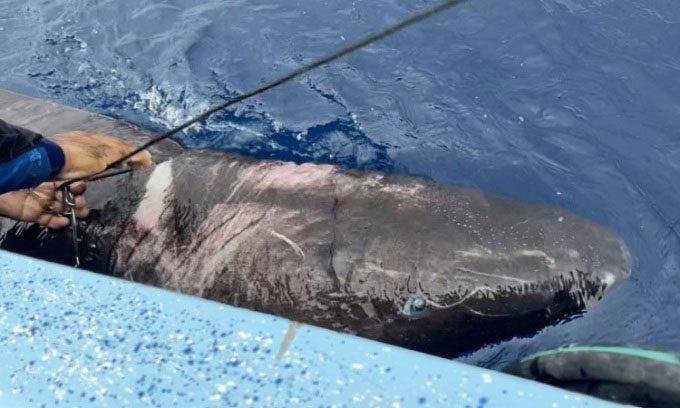Biologists Are Amazed by the Discovery of a Mysterious Shark Thousands of Kilometers from Its Natural Habitat.
According to research published in the journal Marine Biology, a Greenland shark, the longest-living vertebrate on Earth, was discovered in the tropical waters of the Caribbean. Researchers encountered the creature while tagging tiger sharks for tracking off the coast of the Caribbean, Business Insider reported on September 4.

The Greenland shark off the coast of Belize. (Photo: Mashable).
After setting nets at the Glover’s Reef in Belize, a team of biologists returned and noticed the net had drifted several kilometers away from the reef, into waters as deep as 610 meters. When they retrieved the net, they were astonished to find an old Greenland shark. A member of the research team, Hector Daniel Martinez, exclaimed, “It looks very, very old.”
Initially, scientists suspected it was a sixgill shark, a common deep-sea predator, but upon photographing the creature, they confirmed it was indeed a Greenland shark. “We suddenly saw a creature moving slowly, languidly beneath the water,” shared Devanshi Kasana, a biologist at the Conservation and Ecology Laboratory at Florida International University. “It looked like a prehistoric animal.”
Greenland sharks can live up to 250 to 500 years, according to the National Ocean Service (NOS). They reside at depths of thousands of meters in darkness and are rarely seen or photographed. Researchers know very little about their extraordinarily long lifespans. In the deep sea, Greenland sharks mature, move, and age at a very slow pace. Their leisurely lifestyle consumes little energy, making it an adaptation to nutrient-scarce environments. The discovery of a Greenland shark near a coral reef off Belize is surprising but not impossible.
The steep slope of the Caribbean reef plunges to 2,896 meters, providing a cold and dark environment suitable for Greenland sharks. This discovery raises the question of whether this particular individual migrated from the Arctic to the Caribbean or spent most of its life in tropical waters. That remains an unanswered question. Demian Chapman, director of shark and ray conservation research at the Mote Marine Laboratory and Aquarium, suspects it is the only Greenland shark in the area.
Greenland sharks primarily feed on carrion. They consume everything from fish, seals, polar bears, to whales. Some individuals can grow up to 7.3 meters in length and weigh 1,200 kilograms, although they only grow about one centimeter each year. According to a 2016 study, Greenland sharks must be at least 134 years old before they are ready to breed.


















































